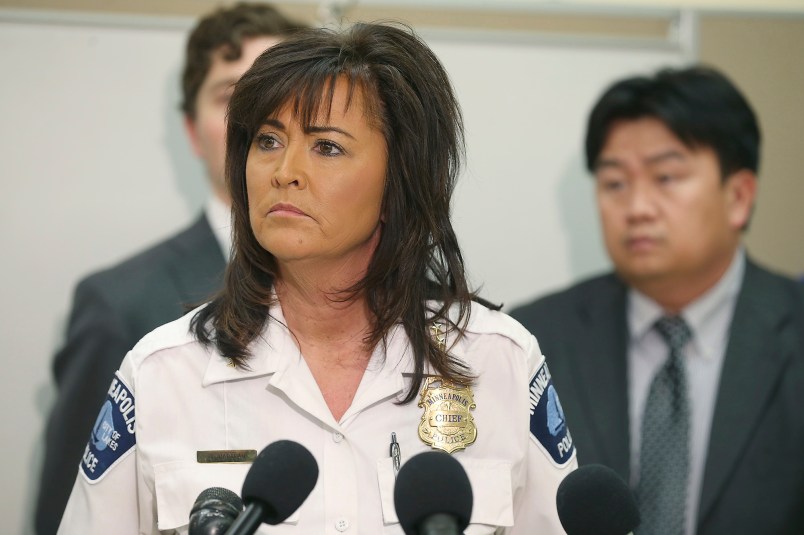MINNEAPOLIS (AP) — Minneapolis police Chief Janee Harteau says she is “willing to step aside to let a fresh set of leadership eyes” be in charge of the department, which has been criticized in the wake of last weekend’s fatal police shooting of an unarmed Australian woman who had called 911.
Harteau’s resignation Friday came at the request of Mayor Betsy Hodges, who said she lost confidence in the chief’s “ability to lead us further.” She said she asked Harteau to step down after assessing where the department needs to go.
“For us to continue to transform policing – and community trust in policing – we need new leadership at MPD,” Hodges said.
Harteau, who worked her way up from the bottom of the department to become the city’s first female, first openly gay and first Native American police chief, said Friday that she was proud of the work she accomplished and honored to serve as chief. But she said the shooting of 40-year-old Justine Damond by one of her officers and other incidents “have caused me to engage in deep reflection.”
The chief, who once successfully filed a discrimination and sexual harassment complaint against the police force along with her partner, said she must “put the communities we serve first” despite the department’s accomplishments under her leadership.
Harteau was out of the city on personal time for nearly a week following last Saturday’s shooting of Damond, a life coach and bride-to-be who was killed by an officer responding to her 911 call of a possible rape.
The state is investigating the shooting. In her first remarks on the case Thursday when she returned to work, Harteau defended the training of Mohamed Noor, the Somali-American officer who shot Damond, but was sharply critical of him.
Still, some City Council members called for a change in leadership.
Linea Palmisano, who represents the ward where Damond died, told fellow council members that she was “done with image control and crisis management” and that it’s “time for action.” After Harteau’s resignation, Palmisano said she looks forward to the start of changes that she feels the department needs to make.
Shortly after the announcement, Hodges nominated Assistant Chief Medaria Arradondo to be the next chief. Nicknamed “Rondo,” he served as the department’s public face after Damond’s shooting while Harteau was out of town. Arradondo, who is African-American, has been with the department since 1989.
Later Friday, Hodges called a news conference at City Hall to elaborate on Harteau’s departure, but she was interrupted by a few dozen protesters who entered the room and demanded that she resign, too. They chanted “Bye-bye Betsy” while waving signs that said “Messy Betsy” and “You are next.” Hodges eventually walked out as they surrounded her at the podium, but she returned later to take questions from reporters.
She said she understands and shares the public’s frustrations, but “I will not be resigning.”
Harteau, who started as a beat cop in 1987 at age 22 and was appointed chief in 2012, had become a political liability for Hodges, who faces several challengers in a tough re-election fight.
Their relationship was strained, particularly after the fatal shooting of 24-year-old Jamar Clark during a confrontation with two white police officers in 2015. The black man’s death, amid heightened tensions around the U.S., sparked protests citywide that included an 18-day occupation outside the police station on the city’s north side. A U.S. Department of Justice review faulted poor communications between the mayor and chief.
Harteau and Hodges clashed again in April when Hodges blocked Harteau’s promotion of Lt. John Delmonico to lead the Fourth Precinct, after the chief had already made the public announcement. Delmonico had been a critic of the mayor when he headed the police union.
And it didn’t help that Harteau was out of town when Damond was killed. Harteau, who said she was backpacking in an area with limited cellphone reception, told reporters Thursday that it would have been “challenging” to return but that she had kept in touch with her command staff.
Police union president Bob Kroll said Harteau’s resignation is a much-needed change for the department and that she handled Damond’s shooting poorly. He said after being gone for days, she returned and “basically throws the whole department under the bus.”
He said he agrees with protesters that Hodges should be next to go, adding that the move against the chief was a political one for Hodges.
The mayor rejected that notion, saying she made the decision because she’s making the city a priority.
Harteau and her longtime patrol partner, Holly Keegel, were featured in a 1990 episode of the reality TV series “Cops.” The partners endured years of harassment from some male colleagues, and it escalated to the point where they felt endangered because they weren’t getting help when they would call for backup. The Minnesota Department of Human Rights upheld their discrimination and sexual harassment complaint, which led to discipline against some officers and changes in training.
Harteau and Keegel got married in 2013 after gay marriage became legal in Minnesota. Harteau told the Star Tribune a year later that they had separated amid the strains of her being chief.
The chief was honored as grand marshal of the city’s annual Pride Parade three years ago. But in June, organizers asked law enforcement to minimize their participation due to tensions over a suburban Minneapolis police officer’s recent acquittal in last summer’s fatal shooting of black motorist Philando Castile.
Harteau said she was “beyond disappointed” that she was not consulted beforehand, but later persuaded organizers to welcome LGBT officers after all.
—
Associated Press writer Kyle Potter contributed from St. Paul, Minnesota.



